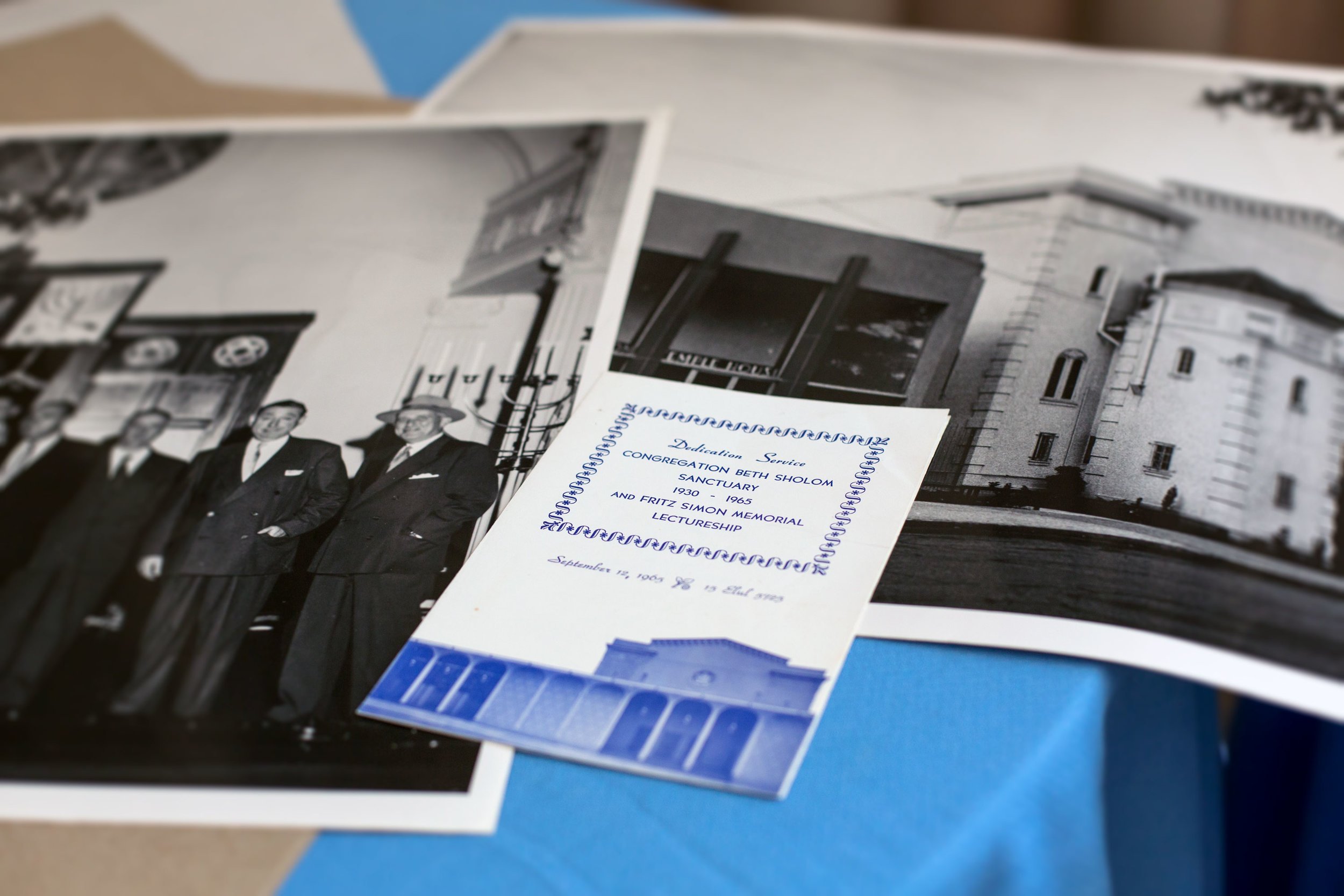
Our History
The Early Years
Congregation Beth Sholom was unofficially founded in 1906, when the great earthquake forced many Russian Jewish émigrés to observe Rosh Hashanah that year in a Richmond District refugee camp. 17 men joined together to officially found Congregation Beth Sholom in October 1921. Services were held in a Baptist church on Fourth Avenue that the founders purchased and remodeled as a shul. Thirteen years later, in 1934, the cornerstone of Beth Sholom’s first synagogue was laid at the corner of 14th Avenue and Clement Street. That same year, Saul E. White (z”l) was installed as the first rabbi.
Rabbi White served as Congregation Beth Sholom’s rabbi for 48 years, until his retirement in 1983. He took stands on many major sociopolitical issues of his day and, under his leadership, CBS prospered and became a leading progressive voice in the Jewish community, advocating for women’s rights, the disadvantaged, and other social justice issues. Wearing his tallit and carrying a Torah, Rabbi White famously marched down Market Street as one of the Bay Area’s first clergymen to protest the Vietnam War. But Rabbi White was also a scholar so respected in the Jewish community that he earned the nickname “Dean of Bay Area rabbis.” One of his legacies is the Brandeis School of San Francisco, which Rabbi White founded in 1963, serving as its guiding spirit.
A Place of Learning and Growth
In the 1960s, Beth Sholom was the Bay Area pioneer in presenting scholarly lectures by educators, historians, and international personalities on Jewish topics and heritage. CBS also brought outstanding musical artists and prominent authors to the pulpit of the synagogue. Inspired by the success of these activities, an adult studies program evolved, featuring seminars by rabbis, authors, and local scholars. These activities were supplemented with classes in Hebrew, Yiddish, and current events.
Following Rabbi White’s retirement, Rabbi Allan Schranz (z”l) was elected to succeed him and, in 1986, Rabbi Alexander Graubart (z”l) became the third spiritual leader of Congregation Beth Sholom. Five years later, in 1991, Rabbi Alan Lew (z”l) stepped into the position.
A poet, writer, and practitioner of Zen Buddhism, Rabbi Lew exercised a profound influence on the congregation and the entire Bay Area Jewish and secular communities. While at CBS, Rabbi Lew cofounded the popular Jewish meditation center, Makor Or, with Zoketsu Norman Fischer. (Makor Or is now a program of the Taube Center for Jewish Life at the Jewish Community Center of San Francisco.) A formidable speaker, activist voice for social justice, and advocate for the homeless, Rabbi Lew was regarded by many as Beth Sholom’s spiritual heir to Rabbi White. Rabbi Lew retired in 2005 and served as the congregation’s rabbi emeritus until his untimely death in 2009.
Rabbi Kenneth Leitner served the congregation for two years until Rabbi Micah Hyman joined Beth Sholom in 2007. During his seven years at CBS, Rabbi Hyman was beloved for his infectious personality, engaging manner at the pulpit, and ability to relate to congregants of all ages.
Rabbi Aubrey Glazer served the congregation for four years, from July, 2014 to June, 2018. During his tenure, Rabbi Glazer led our congregation with a keen sensibility for the evolving nature of Jewish tradition, bringing new forms of music and other innovations to our communal life.
Rabbi Dan Ain became Beth Sholom’s spiritual leader in July of 2018. He brought a passion for developing meaningful ways to worship in the 21st century and was instrumental in maintaining our strong community in the face of a pandemic that challenged our ability to connect. Rabbi Ain found holiness in honest conversation, a value he instilled in many.
Current Leadership
Rabbi Amanda Russell, who began with Congregation Beth Sholom as a Rabbinic Intern and became the synagogue’s Associate Rabbi before becoming its Rabbi, is devoted to creating a warm, friendly and welcoming environment for everyone. Rabbi Russell strives to create opportunities to experience the joys of Judaism by making our rich traditions and values relevant in today’s world. Through prayer, song, learning and ruach, Rabbi Russell seeks to connect people of all ages and all backgrounds in meaningful ways to each other and to Torah.
While remaining committed to significant Jewish observance, the State of Israel, social activism, and egalitarianism, Beth Sholom has been a vanguard for change within the Conservative movement. It was among the first Conservative synagogues to provide women equal participation in all aspects of religious life — including aliyot (calls to Torah) and the daily minyan — and to recognize its LGBTQ members. Beth Sholom was also the first synagogue to house a Jewish meditation center.
